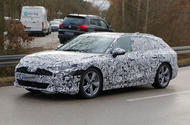The A7 Avant was spotted testing on roads around Germany
New and renamed model seen testing in hybrid guise as Audi prepares to take on new BMW 5 Series from 2025
The Audi A7 Avant is being prepared as the successor to the A6 Avant, touting a bold redesign and wide-reaching technology updates while sticking with combustion power.
Due on sale in 2025, the estate takes a new name as part of a new Audi naming strategy that’s intended to make it easier to tell apart ICE cars and EVs: the former have odd numbers, the latter even numbers.
The A6 name will be used next year for an equivalent but unrelated E-tron electric model based on Audi’s new PPE platform.
An A7 Avant prototype has been spotted testing on roads around Germany with a design reminiscent of the smaller A5 Avant – the forthcoming replacement for the A4 Avant.
At the front, it features slim, redesigned headlights, Audi’s traditional hexagonal radiator grille and a streamlined bonnet.
The alloy wheels have been redesigned, the door handles are flush with the bodywork and at the rear it gets a bumper-width light bar and reshaped twin exhausts.
The A7 Avant will arrive alongside a new A7 Sportback, which will replace the A6 saloon that has been on sale in the UK since 2018.
The duo will serve as rivals to the BMW 5 Series Touring and Mercedes-Benz E-Class.
It remains to be seen how similar the engine line-up will be to that of today’s car, but yellow warning stickers on the spotted prototype’s windows signal that it has some electrical assistance.
The estate will continue to use the Volkswagen Group’s MLB platform, but its rear structure will be modified to accommodate a 14.4kWh lithium ion battery in the PHEV variant, which will offer an electric-only range of around 60 miles.
It’s expected to be larger than the A6 Avant in order to accommodate the hybrid system. For reference, the current estate measures 4939mm long, 1886mm wide and 1467mm tall.
Performance editions are likely to follow and will be marked out from the standard A7 by more aggressive bumpers, wider air ducts and wider exhausts – together with substantial power boosts.







